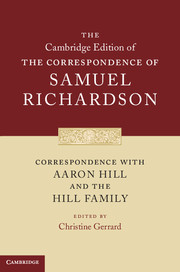General Introduction
Published online by Cambridge University Press: 30 June 2022
Summary
Aaron Hill occupies a special place among Samuel Richardson's correspondents. He was Richardson's earliest literary friend; and although Richardson later censored the unguarded expressions of emotion which coloured their correspondence (‘All Mr Hill's Praises too warm, and should be lowered greatly’), he confessed that ‘no Man Ever had a more expanded Heart, and truer Friendship, nor more Sincerity’. Hill and Richardson met in the early 1720s when Richardson acted as the printer for Hill's periodical The Plain Dealer (23 March 1724 to 7 May 1725) and some of his other pieces. Richardson was at this stage a businessman and successful printer. Hill, four years Richardson's senior, was a well-known literary patron, author and impresario, the former stage manager at Drury Lane who introduced Handel to the English stage with his operatic hit Rinaldo (1711). He was the leader of the ‘Hillarian circle’ whose members included the writers James Thomson, David Mallet, Richard Savage, Eliza Haywood, Martha Fowke and Edward Young, future author of Night-Thoughts. It was through Hill that Richardson got to know Thomson, Mallet and especially Edward Young, with whom he established a lifelong friendship. Hill had been educated at Westminster school and in his early youth had travelled widely. At fifteen he had undertaken the voyage to Constantinople, where his distant relative, Lord Paget, was ambassador. Hill's A Full and Just Account of the Ottoman Empire (1709), which he later disparaged to Richardson as a ‘light piece of work’ and a ‘puerile sally’, nonetheless testified to a life of exoticism and adventure very different from the life to which the pious and industrious Richardson had been raised as an apprentice printer in London. Richardson had never travelled abroad and Hill was one of his sources for the foreign detail in his novels.
Yet by 1736, the point at which their correspondence starts in earnest, Hill's fortunes had started to decline. In financial difficulty following an unresolved Chancery lawsuit concerning his dead wife Margaret Morris's estate, he moved in late 1738 with his two younger daughters Astrea and Minerva from Petty France in Westminster to Hyde House in Plaistow. Plaistow was at this time a rural village on the edge of the Essex marshes.
- Type
- Chapter
- Information
- Correspondence with Aaron Hill and the Hill Family , pp. xxxiv - lPublisher: Cambridge University PressPrint publication year: 2013

